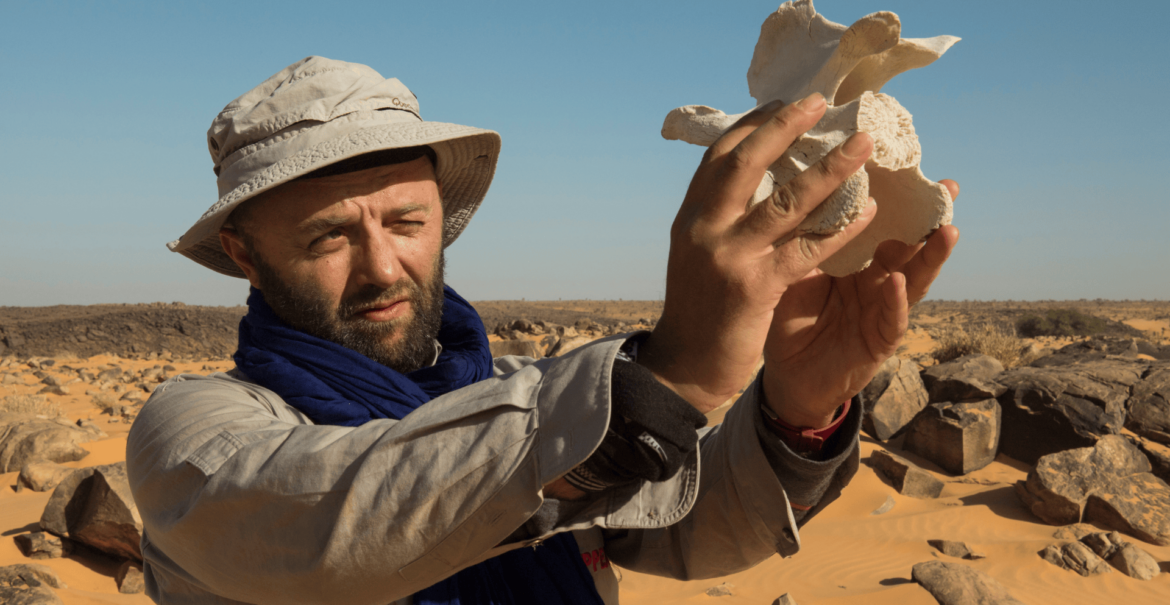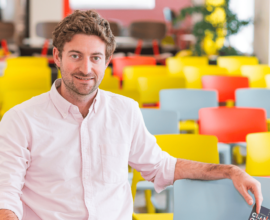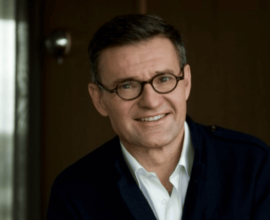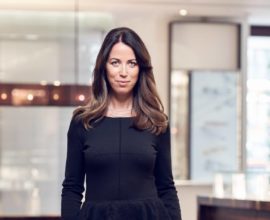Stéphane Dugast
Adventure junkie
![]() Reading Time: 11 minutes
Reading Time: 11 minutes
Writer, author, documentary filmmaker & reporter
After graduating from SciencesCom in 1998, Stéphane Dugast quickly embarked on the adventure of the open sea by becoming a reporter for Cols Bleus, the magazine of the French Navy. Although he is a reporter, director, author and lecturer, we could also describe him as a storytelling explorer.
In a nod to Arthur Rimbaud, one of the many heroes of his youth, we could describe Stéphane Dugast as a ``man with soles of wind``. When we ask him to go back to the sources of this appetite for the unknown, exoticism and the ends of the world, he takes us back to Nantes, between the river Loire and the Sillon de Bretagne, where the young Stéphane first felt the call of distant horizons.
Can you tell us about where you grew up?
I spent my childhood in Saint-Étienne-de-Montluc, on the north bank of the Loire estuary, about twenty kilometres west of Nantes. My grandfather had a mill with an adjoining chapel, on the hills of the Sillon de Bretagne. I grew up in the countryside, in the marshes that lead down to the river Loire. With my brother and cousins, we went frog gigging and raced around on our bikes. It was a wonderful playground and we built huts, rafts and boats from bits and bobs. The boats sunk more often than not. In short, in reference to Jean Becker’s film, it was a childhood in the marshes. I was very interested in imaginary worlds, the cinema of Eddy Mitchell and the Dernière Séance, with his war films and westerns, and all those films that told of elsewhere.
The landscapes of my childhood were rural and earthy, with the promise of the unseen ocean nearby. If I had to remember only one image from that childhood, it would be of the big oak tree where we built our wooden hut adjoining the vineyards and my grandfather Jean Redor’s ancient stone mill. Our imagination always ran wild. As Chouans or confederates, we defended ourselves from attacks by republicans or Indians. We were dreamers and pioneers but I always wanted to go and see what was behind the horizon.
All children have dreams about their adult lives; what were yours?
I never talked about my childhood dreams because I was scared of being told that reality was just around the corner. My first dreams of open spaces came to me while I was growing up between the river Loire and the Sillon. The promise of elsewhere was calling. As a teenager, I felt good about myself but began to long to go overseas, to the desert, the tropics, the ice floes and all those other places that you dream about when you’re sitting at home. Each time I saw a boat, I wanted to go aboard and cross the ocean to the end of the world. I watched the Indiana Jones films so many times I’ve lost count and of course I dreamed of becoming an archaeologist.
I had the complete collection of Jules Verne’s Extraordinary Voyages, so of course I dreamt of coconut palms, desert islands and all the things that make up the explorer’s “playground”. And what had to happen happened: I ended up dreaming of becoming an explorer.
What kind of a child were you?
I was sociable but a bit of a loner. I was never afraid of being on my own but also able to fit in with a group. After all, I was a reporter on board navy ships for sixteen years, so you had to have some social skills to fit into that environment.
I was curious and attracted to everything; after meeting a baker, I wanted to be a baker, after meeting a writer, I wanted to be a writer… However, I soon realised that storytelling was my thing. I started a newspaper at school, where I wrote my first column about the film Crocodile Dundee. I got a taste for writing. I mistook myself for Arthur Rimbaud and wrote poems to my girlfriends until getting 4/20 in French for my baccalaureate brought me back down to earth a bit…
That didn’t stop you from writing books later on! We’ll come back to that. In the meantime, what did you study?
I took my baccalaureate in 1992, at a time when everything was possible in Europe. The USSR had disbanded and I was learning Russian and dreaming of working in Eastern Europe. I ended up studying economics in Nantes, just across the road from Audencia! In my heart, I still wanted to travel but my dreams of exploration and writing were fading. I put my energy into sport and competed in triathlons.
After my bachelor in economics, I headed to Lille to do my master and spent an Erasmus year in Ireland. I became a columnist at the France Bleu Nord radio station and that was the trigger! Telling stories to others was what I wanted to do. Back in Nantes, my mother told me about a postgraduate course at SciencesCom. I saw that an alum, Alexandre Boyon, had become a sports journalist at France Television so I called him and he advised me to join, telling me it would open the doors to becoming a journalist. I think that’s what motivated me….
My years at SciencesCom were both instructive and festive. I had a great time but the last six months were tough as I spent a lot of time at my mother’s bedside in hospital. She died at the end of the year. After SciencesCom, I wanted to ‘eat’ the world but I had to do my military service first. Luckily, I got into ‘Sirpa’, the army’s information and public relations service.
And your military service gave you the opportunity…
At the end of my television internship at Paris Première, I moved to the editorial staff of Cols Bleus, the magazine of the French Navy. I ended my military service as an able seaman and tried to get a permanent job at Cols Bleus. My editor gave me 48 hours to prove to him that I was the right person for him to hire. I came back with an interview of Robert Hossein who was putting on his show “Celui qui a dit non” about General de Gaulle, hardly suspecting that the majority of the navy had not been very pro de Gaulle! By chance, my superior officer was a Gaullist; he hired me and that lasted 16 years.
For a long time, I was the only reporter at Cols Bleus. I was finally able to travel, fulfil my dreams, make documentaries… The last years at Cols Bleus were nevertheless difficult. I was put in a siding and didn’t travel anymore. This gave me the time to write a biography of Paul-Émile Victor, take a course in geopolitics at IRIS (Institut de Relations Internationales et Stratégiques) and a course in creative writing before finally being promoted to editor-in-chief of the newspaper!

What do you think was your first real exploration?
It was in 2001. My coverage of the Charles de Gaulle aircraft carrier had gone badly; I was on the verge of quitting the Navy when I was given the chance to join a ship on its way to Clipperton, an isolated French atoll in the North East Pacific. I managed to get aboard ship as it passed through the Panama Canal. When we approached Clipperton, I found myself facing the mysterious island I had dreamed of and fantasised about in my reading. Nevertheless, frustrations bubbled to the surface as the boat only stayed there for three days, enough time for the army to restore the marks of French sovereignty and to make an inventory of the crabs, birds and coconut trees. I counted them myself; there were exactly 387 at the time!
Three days is not very long, I wanted to stay there for two months! However, this first report enabled me to scout for my second trip to Clipperton, which led to my first documentary for Thalassa, a legendary TV programme that I filmed in 2003 with the renowned polar explorer Jean-Louis Etienne as my main character. In 2015, I returned to Clipperton, with an international expedition and was how the atoll had changed. Rats had replaced the crabs and the beaches looked very different due to erosion and rising sea levels…. Proof that Clipperton is a French sentinel in the middle of the ocean.
To come back to solitude, is it an inevitable part of being an explorer?
Yes, partly. I dream of being Robinson Crusoe alone on a deserted island like Clipperton. Solitude means you have to face yourself, with your qualities and faults. When I cycled through France for my project La France Réenchantée, I had long moments of solitude, but if you’re not afraid to embrace it, solitude can make you feel alive and put you in touch with the precious things in life. Similarly, I have sometimes found myself alone in corners of the Arctic. The relationship with nature is very powerful, both majestic and terrifying. From a very reassuring blue sky, all of a sudden, the wind starts to blow, you are cold, you can’t take shelter, the ice is thin and threatens to give way under your weight… You find yourself face to face with yourself, which makes you both fragile and strong. The link between life and death becomes tangible, immediate, reminding us of that very fine line that we so easily forget in today’s consumer society.
People say you are an explorer; do you accept the description?
I don’t know if I can call myself an explorer. My daughter Joséphine always tells me that she doesn’t know what to put in the boxes when asked about my profession. Author, writer, director, explorer? In my opinion, many explorers are real scientists, archaeologists, oceanographers… Others are more sporting or heroic, like Mike Horn. As far as I am concerned, I explore to share stories and transmission is important to me; my parents were teachers… I like to turn on the light and say that everything is possible. So I am also a transmitter, a storyteller, who makes films, documentaries, books… I also work for the press, Historia, Terre Sauvage, Figaro magazine, Géo and Détours en France.
When I was asked to join the Society of Explorers, of which I have been Secretary General since 2015, I hesitated for a long time. For me, explorers are Paul-Émile Victor, Théodore Monod… I accepted because the question remains open. We have real debates about the differences between an explorer, an adventurer and a traveller… I am a traveller when I go to Venice with my wife for the weekend. An adventurer takes risks and expects the unexpected. Explorers are not necessarily carrying out something useful, instead making a beautiful promise made to society. Uselessness takes on its full meaning when it is shared, hence my need to tell and transmit.
Who has inspired your calling for exploring?
There are so many! Paul-Émile Victor of course, especially as I’m his biographer. Then there’s Jean-Baptiste Charcot, scientist, medical doctor and polar scientist, himself a mentor to Paul-Émile Victor. The fascinating Philippe de Dieuleveult, who inspired a whole generation with his TV programme La Chasse au Trésor (The Treasure Hunt) in the 1980s, who disappeared in the Zambezi Falls and whom we later learnt was an agent of the DGSE (French intelligence service)… The writer and novelist Joseph Kessel, of course, whose books I devoured. There are also the fictional figures, like Indiana Jones, who shaped my desire and need for adventure.
You pay particular attention to the world and the people who inhabit it. Are you empathetic?
When I first started out, I travelled a lot to soak up exotic and unexpected experiences, but I soon needed something else. I wanted to understand the planet and the people who live on it; perhaps this is empathy. In any case, I try to give some of my time and energy to humanitarian causes. I’ve been quite involved in the NGO Aviation Sans Frontières and have written a book for them. I have been on the ground with them and have accompanied sick children to Burundi…
I also try to get involved in these causes through the Explorers’ Society. We will soon be hosting a director who has followed a migrant artist on his journey across the Mediterranean. There will be volunteers from SOS Méditerranée who will tell their stories of the people who are ready to take any risk to cross the sea. It is another form of exploration, so much more risky than the one I, as a westerner, accomplish.
The shelves in your office are groaning with books. Can you share some of the titles with us?
Just behind me is a shelf of graphic novels; I’m crazy about comics, especially adventure comics. If I had to choose just one, it would be R97, les hommes à terre by Bernard Giraudeau and my friend Christian Cailleaux. It tells the story of the sailors on board the Jeanne d’Arc, the French Navy’s ship. I also have many reference books on exploration. I would mention Michel le Bris, the creator of the Étonnants Voyageurs festival, and his Dictionnaire amoureux des explorateurs, and then of course L’Usage du monde by the Swiss travel writer Nicolas Bouvier. At the top, there is the complete collection of Joseph Kessel’s works, alongside works by Alexandra David-Neel, Robert Capa and many others. There is a pile of novels waiting to be read, and, dare I say, a shelf with the fifteen or so books I have written myself.

Can you tell us about your next adventures?
I’m a bit superstitious about this; I don’t like to talk about projects that I haven’t signed up for yet. However, I am definitely going to be travelling through the canals of Patagonia and along the Antarctic Peninsula as a guest speaker of a tour operator. I would also like to start writing screenplays, fiction for comics and, ultimately, for film. The Société des Gens de Lettres has just accepted me on a course I have been yearning to do for a long time. I have written about fifteen books, atlases, illustrated books, surveys, a biography…. and I have the impression that in terms of publishing I have more or less done the rounds. I think it’s time to move on to stories that are a little more universal, and even some fiction.
What advice would you give to Audencia students who want to follow in your footsteps?
First of all, I would advise them not to set limits for themselves. I would tell them that everything is possible, that utopia is a nice word. To quote Theodor Monod “Utopia is not the unattainable but the unrealised”. I think I’ve taken the utopian route. I believe that if you have a dream you can go for it as long as you try to align what you have in your head – this intellect with which you make your dreams – with two things: your own eyes, which are not yet very sharp when you leave your studies, and your heart and guts.
However, you should never lose sight of the fact that being an explorer looks great on paper but is very vague in terms of a career and not very lucrative! Personally, I accept this freedom, which means that some months you struggle to make ends meet while others are more comfortable. It’s part of the deal and you have to know that before you start. At the beginning of my career, Jean-Louis Etienne said to me: “You’ll see, if you want to do this job, the main thing is to last the journey”. In other words, you can make a few hits, do some great exploring followed by a beautiful book; it’s hard not to get carried away, but it can all stop as quickly as it started.
What did you do last weekend? And what will you be doing next weekend?
On Saturday I worked, because you can’t always count the hours needed to get a job done. In the evening, I watched Black Hearts, with my family, a series about the Special Forces in Iraq. On Sunday, I went for a three-hour ride on a gravel bike in the Bois de Boulogne – I need nature and chlorophyll. My wife and I are also planning to go to the cinema and see an exhibition. If you’re going to live in Paris, you might as well let yourself enjoy life in the capital, which has so many treasures.
Is it difficult to reconcile your passion for exploring with family life?
My daughter Josephine is 14 and I was 35 when she was born. I’ve always tried to give her quality time over quantity time and favour projects that might take me a month to complete, but that will result in a book or a film. Moreover, as an explorer, you are often behind a computer building projects and coordinating them. Even if I do travel a lot to festivals in France, I am still at home a lot. In the end, I’m away two or three months a year, and not all at once, so yes, I manage to reconcile my explorer’s life with my family life.




